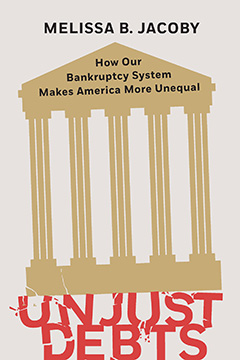“Our country is facing an economic inequality crisis. We cannot understand the systemic roots of this crisis without cutting through the knot of American bankruptcy. The bankruptcy system ruins the lives of ordinary people while shielding the wealthy and powerful from accountability. Unjust Debts is an indispensable guide to understanding this problem—and points to concrete solutions for dismantling it.”—Mechele Dickerson, University of Texas at Austin, and author of Homeownership and America’s Financial Underclass |
“A serious subject made accessible through great storytelling: Unjust Debts by Melissa Jacoby is a must-read that brings bankruptcy law to life. A companion to The Whiteness of Wealth and The Color of Law, Jacoby shows how a color-blind statute operates in a world where bankruptcy filers bring their racial identities into bankruptcy court. Unjust Debts also demonstrates how corporations are winners even in court and provides a path to reform.”—Dorothy A. Brown, Georgetown University, and bestselling author of The Whiteness of Wealth |
“A constitutional grant of second chances to overburdened people has transformed into a corporate escape hatch for shocking acts of misconduct, and Melissa Jacoby painstakingly documents that transformation. The fight to reverse the terrible slide of bankruptcy into a tool for business manipulation begins with you reading this book.”—David Dayen, journalist and author of Monopolized |
“Jacoby’s assured prose brings extraordinary clarity to an intentionally opaque and labyrinthine system. It’s an eye-opening look at the laws that undergird American inequality.”—Publishers Weekly (starred review) |
“[Unjust Debts] goes a long way towards demystifying the web of complexity in personal and business bankruptcy.”—TLS |
“Melissa Jacoby’s Unjust Debts takes on the gross inequality that victims face every day in mass tort cases. If we can’t grasp the magnitude of the problem, we’ll never be able to fix it. The American bankruptcy system is fundamentally broken and every policymaker in America should be reading this book.”—Ryan Hampton, addiction recovery advocate and bestselling author of American Fix and Unsettled |
“Unjust Debts throws open the doors and windows to the bankruptcy system so readers can see for themselves how this law works and doesn’t work for the real people it so profoundly affects.”—Beth Macy, New York Times bestselling author of Dopesick and Raising Lazarus |
“Bankruptcy—which touches millions of Americans—is supposed to be society’s safety valve for hard times. Instead, Unjust Debts exposes how our unjust system simply exacerbates the problems it was created to fix. With wit and wisdom, Melissa Jacoby offers a master class in this vitally important and deeply flawed corner of our legal system.”—Zephyr Teachout, Fordham University, and author of Break ’Em Up |
|
“A searing indictment of our bankruptcy system, Unjust Debts powerfully and persuasively shows that it is a system that fails to protect individuals, especially people of color, while helping corporations get away with inflicting serious harms. Jacoby makes complex bankruptcy law clear and accessible and offers proposals to create a far more just system.”—Erwin Chemerinsky, University of California, Berkeley, and bestselling author of Presumed Guilty |
“The U.S. bankruptcy system is considered to be the model for the world. But Melissa Jacoby in this important work shows us how powerful and deep-pocketed actors can still corrupt a seemingly ideal system for their own ends.”—Sujeet Indap, Wall Street Editor at the Financial Times and co-author of Caesars Palace Coup |
“An exposé of the racial, class, and corporate biases in the U.S. bankruptcy system. . . . [Unjust Debts] is deserving of wide readership.”—Kirkus Reviews |
“In this compelling book Jacoby . . . shows how the bankruptcy code favours fake people, also known as corporations, over real people, especially relatively disadvantaged ones. . . . This is a highly disturbing account.”—Financial Times |
“Unjust Debts is an important book. Written to welcome all readers into the world of bankruptcy, the book chronicles the evolution of one of the most important legal institutions in our market-based democracy.”—Harvard Law Review |
“Unjust Debts synthesizes three decades of research into the system’s frustrating contradictions, helpfully summarizes the crux of the issue as bankruptcy’s ‘structural bias in favor of artificial persons’—i.e., corporations, nonprofits, and constructed entities explicitly designed to shield rich and powerful owners from the consequences of their misdeeds.”—The American Prospect |
“What is the foundation upon which inequality in America is built? We have come to understand so much of that hidden architecture in recent years—and now, in Unjust Debts, Melissa Jacoby brilliantly unearths one of the largest, and least-understood building blocks.”—Michael Eric Dyson, Vanderbilt University, and New York Times bestselling author of Tears We Cannot Stop |
|


